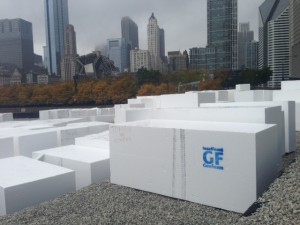Before you Choose
Understanding Thermal Drift & R-Value
Thermal drift and R-value sound as though they are terms that belong in an episode of Star Trek rather than in a blog post about rigid foam insulation. Rest assured, you did not stumble upon a fan club website. Both of these terms are relevant and important to understand to make an informed decision about your rigid foam insulation project.
What is R-value?
R-value is the measure of a material’s ability to restrict heat flow. According to the EPS Industry Alliance, the U.S. Federal Trade Commission (FTC) established the R-value as a tool to provide a standard for thermal testing results. The larger the R-value, the greater the insulating power.

Thermal Drift
Many foam insulations are composed of numerous tiny “cells” within a polymer material. If these cells are fully enclosed like an inflated balloon, then the foam is considered to be closed cell. For closed cell insulation foam, a factor to consider is the blowing agent used to produce the product, as that impacts the R-value and the insulation’s long-term thermal stability. For XPS, polyiso, and closed-cell spray foams, the blowing agent is a gas the manufacturer introduces into a liquid plastic to create a foam via numerous bubbles. As the plastic hardens, the gas is trapped in the bubbles.
A blowing agent can enhance the insulation’s thermal resistance (R-value) when trapped in the cells, but, despite having completely formed cells, some rigid foams’ blowing agents diffuse over time and are replaced by air. Such is the case with XPS and polyiso insulations, while EPS insulations already have air trapped in the cells. This matters because if the blowing agent boosts the insulation’s R-value, as it dissipates the R-value will decrease (in other words, the insulation becomes less effective over time at doing its job). This is known as thermal drift.
Conclusion
Thermal drift and R-value may have a Star Trek sound to them, but they are important factors to consider when searching for rigid foam insulation. While all closed cell foam insulators have a good R-value, consider the thermal drift that occurs within the foam. EPS does not experience thermal drift during its time in service, and typically is the only rigid foam insulation that manufacturers (like Insulfoam) guarantee 100% of the R-value for the life of the product. The best way to determine if an insulation will experience thermal drift is to review the manufacturer’s warranty.




